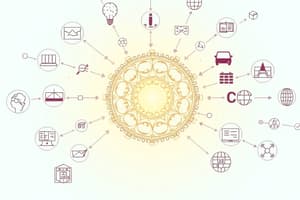Podcast
Questions and Answers
According to Socrates, what is the beginning of true knowledge?
According to Socrates, what is the beginning of true knowledge?
- Studying philosophical texts
- Knowledge of external facts
- Admitting one’s ignorance (correct)
- Accepting one’s limitations
What is suggested to enhance a person's happiness and decision-making according to Meg Selig?
What is suggested to enhance a person's happiness and decision-making according to Meg Selig?
- Following others' opinions
- Understanding one's own identity (correct)
- Pursuing wisdom through social interactions
- Knowing one's future beliefs
What does introspection involve?
What does introspection involve?
- Examining one's own thoughts and feelings (correct)
- Critiquing philosophical ideas
- Gaining knowledge from external experiences
- Analyzing others' behaviors
Which philosopher emphasized the essence of knowledge as self-knowledge?
Which philosopher emphasized the essence of knowledge as self-knowledge?
How does self-knowledge affect an individual's resistance to social pressure?
How does self-knowledge affect an individual's resistance to social pressure?
What fundamental aspect of human consciousness is linked to personality?
What fundamental aspect of human consciousness is linked to personality?
How does knowing oneself contribute to better life choices?
How does knowing oneself contribute to better life choices?
What is a potential outcome of developing self-knowledge based on the discussed theories?
What is a potential outcome of developing self-knowledge based on the discussed theories?
What is the main characteristic of post-conventional moral reasoning?
What is the main characteristic of post-conventional moral reasoning?
Which emotion is NOT one of the six basic emotions identified by Paul Ekman?
Which emotion is NOT one of the six basic emotions identified by Paul Ekman?
What is the focus of Erikson's theory during the 'Identity vs. Role Confusion' stage?
What is the focus of Erikson's theory during the 'Identity vs. Role Confusion' stage?
During which stage of Erikson's psychosocial development do children learn to assert their independence?
During which stage of Erikson's psychosocial development do children learn to assert their independence?
What is the outcome of successfully negotiation during the 'Initiative vs. Guilt' stage?
What is the outcome of successfully negotiation during the 'Initiative vs. Guilt' stage?
How is emotion defined in the context given?
How is emotion defined in the context given?
What can result from failure to resolve the 'Autonomy vs. Shame and Doubt' stage?
What can result from failure to resolve the 'Autonomy vs. Shame and Doubt' stage?
What does the Latin verb 'movare' signify in relation to emotions?
What does the Latin verb 'movare' signify in relation to emotions?
What can possibly result from failure to navigate the identity vs. role confusion stage during adolescence?
What can possibly result from failure to navigate the identity vs. role confusion stage during adolescence?
What is the main concern of individuals aged 6-12 years during the stage of inferiority?
What is the main concern of individuals aged 6-12 years during the stage of inferiority?
During which life stage do individuals focus on forming intimate relationships?
During which life stage do individuals focus on forming intimate relationships?
What is a potential consequence of failing in the generativity vs. stagnation stage?
What is a potential consequence of failing in the generativity vs. stagnation stage?
What stage follows the identity vs. role confusion stage according to Erik Erikson's theory?
What stage follows the identity vs. role confusion stage according to Erik Erikson's theory?
Which statement best describes Erik Erikson's psychosocial development theory?
Which statement best describes Erik Erikson's psychosocial development theory?
What is the focus of the ego integrity vs. despair stage?
What is the focus of the ego integrity vs. despair stage?
At what age range does the industry vs. inferiority stage occur?
At what age range does the industry vs. inferiority stage occur?
What is the primary function of the amygdala?
What is the primary function of the amygdala?
Which structure is primarily responsible for the formation of new memories?
Which structure is primarily responsible for the formation of new memories?
Which gland is referred to as the 'master gland' and controls hormone release?
Which gland is referred to as the 'master gland' and controls hormone release?
What role does the thalamus primarily serve in the brain?
What role does the thalamus primarily serve in the brain?
What do attitudes represent in an individual?
What do attitudes represent in an individual?
The limbic system is primarily involved in which of the following functions?
The limbic system is primarily involved in which of the following functions?
Which aspect of a person's development is influenced by their values?
Which aspect of a person's development is influenced by their values?
What is generally described by Kohlberg's theory?
What is generally described by Kohlberg's theory?
What does the psychological aspect of a person involve?
What does the psychological aspect of a person involve?
Which of the following is NOT considered a basic human drive?
Which of the following is NOT considered a basic human drive?
How do values influence an individual's behavior?
How do values influence an individual's behavior?
What does post-conventional reasoning typically refer to?
What does post-conventional reasoning typically refer to?
Which cognitive function is associated with the psychological aspect of attitudes?
Which cognitive function is associated with the psychological aspect of attitudes?
Flashcards are hidden until you start studying
Study Notes
Identity and Self-Knowledge
- Understanding one's identity leads to personal happiness and self-expression.
- Socrates emphasized self-knowledge as essential for true understanding, beginning with admitting ignorance.
- Plato built on Socratic ideas, asserting self-knowledge as the essence of wisdom.
- Ancient texts, like the Upanishads, highlight the importance of "enquiry into the truth of the self."
Concept of Self
- Defined as the quality of being and the source of consciousness.
- Represents the agent behind a person's thoughts and actions.
Personality and Introspection
- Personality encompasses an individual's behaviors, thoughts, feelings, and motives.
- Introspection involves self-reflection and encourages deeper self-awareness through examining inner experiences.
Attitudes and Behavior
- Attitudes consist of thoughts, feelings, and emotions towards people, objects, and situations.
- Behavior manifests from attitudes shaped by personal values and beliefs.
Holistic Development
- Development includes physiological, cognitive, social, psychological, and spiritual aspects.
- Basic human drives (hunger, thirst) dictate biological needs, while affect encompasses emotional experiences.
Feelings and Emotions
- Feelings, moods, and emotions are distinct yet interconnected experiences.
- Six basic emotions identified by Paul Ekman: happiness, sadness, fear, anger, surprise, disgust.
Erik Erikson’s Psychosocial Development Stages
- Role confusion is prominent in adolescence (12-18 years), focused on identity shaping.
- Eight stages of psychosocial development address crises pivotal for healthy progression:
- Autonomy vs. Shame and Doubt (1-3 years): Independence leads to self-control.
- Initiative vs. Guilt (3-6 years): Initiative in activities instills purpose.
- Industry vs. Inferiority (6-12 years): Success fosters competence.
- Identity vs. Role Confusion (12-18 years): Exploration of self leads to a strong identity.
- Intimacy vs. Isolation (18-40 years): Successful relationships foster connection.
- Generativity vs. Stagnation (40-65 years): Contribution to society enhances purpose.
- Ego Integrity vs. Despair (65+ years): Reflection on life leads to fulfillment or regret.
Brain Structures and Functions
- Hippocampus: Vital for memory formation and navigation.
- Amygdala: Processes emotions, particularly fear and anger.
- Thalamus: Relays sensory information to the cerebral cortex.
- Hypothalamus: Regulates body functions, including hunger and temperature control.
- Pituitary Gland: Controls hormone secretion influencing growth and metabolism.
- Basal Ganglia: Involved in motor control and emotional regulation.
- Limbic System: Manages emotions, memory, and motivation.
- Cingulate Cortex: Processes emotions and behavior regulation.
- Corpus Callosum: Connects brain hemispheres for communication.
- Prefrontal Cortex: Handles complex behavior, decision-making, and social interactions.
Studying That Suits You
Use AI to generate personalized quizzes and flashcards to suit your learning preferences.




